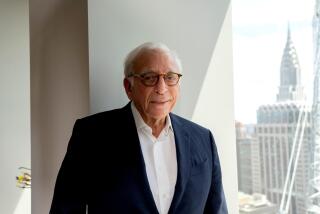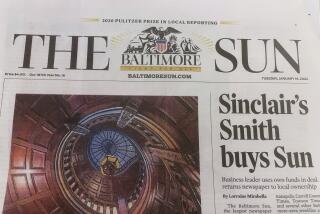Zell casts himself as builder of companies, bettor on dark horses
- Share via
Sam Zell insists he’s a builder, not a breakup artist or an investor who flips companies to make a fast buck.
“Every company I’ve ever been involved with I have built,” said the real estate maverick, who Monday agreed to take Tribune Co. private in an $8.2-billion deal. “We didn’t do this deal to figure out what to get rid of.”
Yet Friday night, Zell and his wife, Helen, were to have dinner with music mogul David Geffen, who has been angling to peel the Los Angeles Times away from Tribune, its corporate parent and owner of 10 other newspapers and 23 TV stations.
Zell said Friday that he regarded the encounter as largely social. Geffen had promised to invite an old college roommate of Zell’s who has worked in the recording industry. “So this is a chance to see someone we haven’t seen in 45 years,” Zell said.
The 65-year-old investor seems in no hurry to sell. “There may be some structure for avoiding the pitfalls” of a spinoff of The Times from Tribune -- including the heavy tax bill it might generate -- but the idea that Zell is purchasing Tribune to slice it up piece by piece “is one of the great conspiratorial theories,” he said.
Zell made his remarks in his first interview with The Times since the deal was announced. Seated in a conference room at a private terminal at Los Angeles International Airport, he was trim and relaxed, dressed casually, and characteristically, in an open-neck sport shirt and blue corduroy suit.
His blue eyes sparkled as he recalled successful deals of the past and the annual motorcycle journey he undertakes with a cadre of friends. (This spring, it starts in Trieste, Italy, and continues down the Dalmatian coast toward Albania.)
But his gaze could harden in anger or reproach in an instant. “You haven’t done your homework,” he would growl at a reporter who displayed an unfamiliarity with one or another of his transactions.
He relished the chance to repeat that his governing principle in business was to look for a contrarian opportunity. “If you follow my history as a businessman, it’s looking at things differently,” he said. “When everybody says, ‘It’s going to be X,’ I’m more than willing to bet my money that it’s going to be Y.”
Zell made a fortune in real estate -- and by turning around distressed assets. He mentions his 1985 acquisition of Itel Corp., a lessor of rail cars and containers. The business was in a prolonged slump. “I can’t even describe to you how a banker responded when you told him you were in the rail-car business in 1985. One of them said, ‘Look, if you want sympathy I’ll give you a charitable gift, but don’t come to me with rail cars.’ ”
That certainly seems to be the theme of his investment in Tribune, which has suffered from declining circulation at its newspapers and been all but written off by Wall Street. “I just think newspapers are extraordinary brands,” he said. “They’re world famous, and I just don’t think the newspaper industry as a whole has figured out how to capitalize or maximize those values.”
He doesn’t claim to have a solution in hand. On meeting Tribune’s management, “I warned them that my methodology is to ask questions, and I don’t kill the messenger.”
Tribune’s top executives are slated to stay on after the deal’s expected closing at the end of this year. Asked what has impressed him about Tribune Chairman and Chief Executive Dennis J. FitzSimons, he replied, “Did I say that I was impressed with Dennis? I don’t think I said anything about Dennis. I think I can tell you that I don’t know Dennis very well, yet. I think he really wants this to succeed, and I’m hoping that the combination can achieve that.”
Among those who have offered advice, he said, was Donald Graham, chairman of Washington Post Co. “I’ve had numerous other calls like that. I’ve got to study and listen. I’m not naive enough to think that we know everything after six weeks. Far, far from it.... But by the time we’re done, we will know this business inside and out.”
Zell said the company’s allocation of capital -- that is, where it invests its resources --will be the key to its fortunes.
“That’s an extraordinarily important part of the equation. Are we trying to do too much? Are we trying to do too little? Should we allocate more capital to interactive, and if so, what do we get for it? You could argue interactive should be growing faster, and is that the result of a lack of capital? I don’t have enough answers yet.”
Among the company’s best-performing units, he noted, was CareerBuilder, an online recruiting service in which Tribune holds a 42.5% stake.
“Anything that’s growing at 25% certainly gets my attention,” he said. “I just wish osmosis would permeate all the other entities the company had so that we could in effect have a 25% growth rate across the board.”
Zell repeated his now-familiar claim that his interest in the newspaper and broadcasting conglomerate was economic, not political. That said, he hinted at his politically conservative viewpoint from time to time. Asked to assess the five newspapers he reads daily -- The Times, the Wall Street Journal, the Chicago Tribune, the New York Times and London’s Financial Times -- he quipped that he read the New York Times “to sort of find out what the other side thinks.”
And he steered reporters to yegsz.com, an online display of the year-end gifts he hands out annually to hundreds of friends and associates. The gift for 2006 was a metallic music box dedicated to criticism of the Sarbanes-Oxley corporate disclosure rules, set to the tune of “Love & Marriage.” (“Sarbanes-Oxley, Sarbanes-Oxley, but for businesses their act is toxic.”)
Zell made these other points during the hourlong interview.
* He hopes to pay down within 10 years the more than $8.2 billion in debt Tribune will take on to go private. He believes the company’s cash flow ($1.3 billion last year) will be adequate to cover debt payments, especially with the tax breaks it gains under its new structure. Nevertheless, cash flow will have to be monitored assiduously.
“I don’t think you need the cash flow to go up,” he said, “you need for it not to go down.”
* He does not expect Federal Communications Commission regulations prohibiting cross-ownership of newspapers and broadcasting stations in the same communities to pose an obstacle because he expects those rules to disappear. Tribune has both a newspaper and a television station in each of five cities: Los Angeles; New York; Fort Lauderdale, Fla.; Hartford, Conn.; and Chicago.
* He believes the deal has been structured to align the interests of employees, who will be the company’s primary owners through an employee stock ownership plan, with his own. “I’m putting $315 million in, and I don’t get any back unless you [employees] make money.”
He noted that senior executives have “in effect taken what would otherwise be bonus money and invested it in the deal.” His reference was to a payout of 8% of the future company’s equity that will be made to top executives starting four years after the acquisition closes.
A shareholder lawsuit filed Friday in Chicago alleges that Tribune management dismissed competing bids and did not get the best price.
* The breakup fee of $25 million, which Tribune would pay Zell if it accepted a higher offer before he completed his acquisition, was set at a low level at Zell’s suggestion. He said he wanted to disavow any notion that his motive was to reap the fee without completing the deal. “I really get off on making 1 plus 1 equals 3. If I can make it 6, even better.”
As for the prospects of a higher bid coming from other investors, “I can’t spend any time worrying about that.”
* The long-standing animus between Tribune management and the Chandler family, the company’s largest shareholders, should be regarded as old news. “Whatever occurred between the Chandlers and Tribune was unfortunate, because the company as a whole suffered as a result.”
The family that controlled the former Times Mirror Co. will be bought out in the transaction.
He said he had never met any of the Chandlers but as a biking aficionado he had visited the Oxnard museum of motorcycle and vintage vehicles that belonged to the late Times Publisher Otis Chandler. “It was magnificent. What he had was gorgeous,” Zell said.
One thing that set the Tribune deal apart from his others, Zell said, was the intense interest it had attracted. “I’ve never been involved in something that so many other people have an answer for,” he said wryly.
But he maintained that a sell-off, unless the terms were extraordinary, was not part of his strategy, despite inquiries from prospective buyers of almost every Tribune paper.
“I’ve gotten letters from four groups in Baltimore, three in Hartford, four guys in Orlando. But we started with the idea and the focus that we would keep all these things together.”
Reminded that Geffen, a Times suitor, is renowned for his tenacity, Zell said he also was not known for backing down easily.
When he meets Geffen for dinner, he said, “you should have confidence that I’m holding my own.”
*
More to Read
The biggest entertainment stories
Get our big stories about Hollywood, film, television, music, arts, culture and more right in your inbox as soon as they publish.
You may occasionally receive promotional content from the Los Angeles Times.










